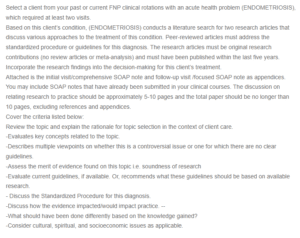Acute Adult Illness
Although older patients are at an increased risk of developing various health conditions, they are more likely to take less medication than prescribed, with the major reason being to avoid extra costs related to the medications (Banskota et al., 2020). Managing the 55-year-old patient’s health, in this case, who has been skipping medications, requires a comprehensive assessment of their health to develop a proper diagnosis and assess the health risks related to the skipped medications.
After performing the physical examination on the patient, additional questions to ask the patient would include how long he has had the symptoms and if there are specific moments the symptoms attack or are exaggerated. Other questions would focus on his medical history, including whether he has ever had any respiratory health issues besides the blood pressure and whether he has a history or any family history of heart disease. I would also question whether he feels dizzy or tired, his current and past lifestyle and eating habits, whether he is sedentary or active, the foods he usually eats, and whether he smokes or drinks alcohol. I would also question him about his current and past mental and emotional status. Additionally, I will ask the patient questions about why he failed to refill their medications in the last three months and if he has been using any other medications, including over-the-counter ones, for the symptoms.
Three Differential Diagnoses
The first diagnosis for the 55-year-old male patient is poorly managed blood pressure. The patient has not been using his prescribed high blood pressure medications in the last three months. The failure to follow up with the treatment and his old age can further elevate his blood pressure to severe levels. The symptoms the patient manifests, such as chest discomfort accompanied by chest pain and shortness of breath, or difficulty breathing, are major symptoms of severe high blood pressure (World Health Organization, 2023).
The second differential diagnosis is congestive heart failure (CHF). This is based on the symptoms the patient manifests, such as shortness of breath and chest discomfort. There is also notable sudden weight gain, as the patient notes that he was 10 pounds lighter a few days ago. In cases of congestive heart failure, a lot of water may be retained, which accounts for the extra weight. A CHF diagnosis is also possible; the patient has a history of poorly managed high blood pressure. The third differential diagnosis is acute coronary syndrome (ACS), a possible diagnosis based on the patient’s symptoms, such as chest discomfort and shortness of breath. Poorly controlled blood pressure can be a contributing factor to the ACS.
Care Plan for the Patient
The care plan for the 55-year-old patient will include first focusing on providing emergency care, including a diagnostic workup to confirm or rule out the three differential diagnoses. The next step would be to educate the patient on various factors contributing to their worsening health conditions, including the need to adhere to the prescribed medication and the need to modify and adopt a healthy lifestyle and diet. Cardiac diet counseling improves the patient’s knowledge of related cardiac diseases such as CHF as well as the outcomes of care (Syamsuddin et al., 2022). Therefore, patient education will focus on improving the patient’s knowledge of their condition and approaches to effective self-management.
References
Banskota, S., Healy, M., & Goldberg, E. M. (2020). 15 Smartphone Apps for Older Adults to Use While in Isolation During the COVID-19 Pandemic. Western Journal of Emergency Medicine, 21(3), 514. https://doi.org/10.5811/WESTJEM.2020.4.47372
Syamsuddin, F., Ayuba, A., & Nasir, N. I. (2022). The Effect of Cardiac Diet Counseling on Knowledge of Heart Diet in Congestive Heart Failure (CHF) Patients at Prof. Dr. H Aloei Saboe Hospital, Gorontalo City. Journal of Community Health Provision, 2(1), 35–41. https://doi.org/10.55885/JCHP.V2I1.116
World Health Organization. (2023, March 16). Hypertension. WHO. https://www.who.int/news-room/fact-sheets/detail/hypertension
ORDER A PLAGIARISM-FREE PAPER HERE
We’ll write everything from scratch
Question 

Acute Health Problem – Endometriosis
A 55-year-old male patient presents to your clinic for his initial visit requesting refills of his blood pressure and blood sugar medication. He states he has been out of his medications for about 3 months and can’t remember the name of either of them. He is also complaining of shortness of breath and chest discomfort over the past week that is gradually worsening. He mentioned that he thinks the scale in the clinic may be wrong because when he weighed himself last week, he was 10 pounds lighter than he is today. VS: Temp- 98.6, HR – 112, Resp – 26, BP- 176/100, pulse ox 94%, ℅ 4/10 chest pain. What other questions would you ask this patient? What are your top 3 differential diagnoses? What is your plan for this patient?